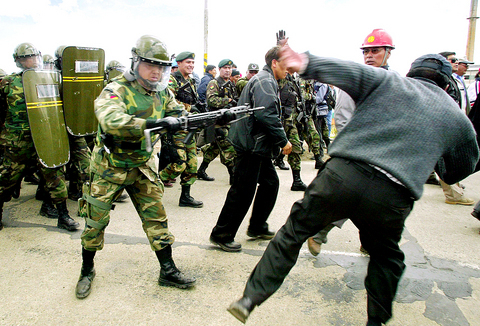Bolivian President Evo Morales signed a decree nationalizing a tin smelter owned by the Swiss mining company Glencore International, a first step toward his declared ambitions to win his government a larger share of Bolivia's mineral wealth.
Morales did not immediately name the terms for the takeover of the Vinto plant, the country's only operating smelter.
He stressed that Bolivia must not only control its rich mineral resources but also the refinement of raw ore into valuable metals.

PHOTO: AFP
"Our natural resources have been looted again and again," Morales told the smelter's employees on Friday.
"We have never been permitted to industrialize our own natural resources," he said. "With so many false pretexts ... they tried to keep Bolivia merely an exporter of raw materials. But now the hour has come to industrialize all of our natural resources."
Officials at Glencore and its Bolivian subsidiary Sinchi Wayra could not immediately be reached for comment.
Morales has spoken broadly about nationalizing Bolivia's mining sector, but the industry's complex structure means that it is unlikely to see an across-the-board move similar to last year's oil and gas nationalization.
The Vinto smelter, located near Oruro on the high Andean plain 180km southeast of La Paz, was -- until Friday -- entirely in private hands, but all of Bolivia's extensive mineral deposits are already owned by the government.
State mining company Comibol works a handful of the deposits, but most are mined through private concessions split between independent Bolivian miners' cooperatives -- most still working with hammer and chisel -- and giant international companies, including Glencore and US-based companies Coeur d'Alene Mines and Apex Silver Mines.
Morales has said that only those concessions left idle or lacking investment will be returned to the state.
In the meantime, the president has proposed a tax hike aimed at recovering more of Bolivia's soaring mineral revenues, driven in part by demand from China.
When Vinto was built in the 1970s, Bolivia exported mostly raw mineral ore, allowing other countries to reap the refining profits.
The Bolivian government sold the Vinto smelter in 2001 to Allied Deals, which later sold it to Comsur, a private mining company whose largest stockholder at the time was former Bolivian president Gonzalo Sanchez de Lozada.
Lozada fled Bolivia in October 2003 during riots against his administration and is still being sought in connection with a crackdown on the protests that left more than 60 Bolivians dead.
Glencore bought the plant from Comsur in 2004, but the shadow of Sanchez de Lozada remains a powerful political symbol in Bolivia.
On Friday, Morales declared that all other mining interests once held by Sanchez de Lozada must be returned to the state.

POLITICAL PRISONERS VS DEPORTEES: Venezuela’s prosecutor’s office slammed the call by El Salvador’s leader, accusing him of crimes against humanity Salvadoran President Nayib Bukele on Sunday proposed carrying out a prisoner swap with Venezuela, suggesting he would exchange Venezuelan deportees from the US his government has kept imprisoned for what he called “political prisoners” in Venezuela. In a post on X, directed at Venezuelan President Nicolas Maduro, Bukele listed off a number of family members of high-level opposition figures in Venezuela, journalists and activists detained during the South American government’s electoral crackdown last year. “The only reason they are imprisoned is for having opposed you and your electoral fraud,” he wrote to Maduro. “However, I want to propose a humanitarian agreement that

ECONOMIC WORRIES: The ruling PAP faces voters amid concerns that the city-state faces the possibility of a recession and job losses amid Washington’s tariffs Singapore yesterday finalized contestants for its general election on Saturday next week, with the ruling People’s Action Party (PAP) fielding 32 new candidates in the biggest refresh of the party that has ruled the city-state since independence in 1965. The move follows a pledge by Singaporean Prime Minister Lawrence Wong (黃循財), who took office last year and assumed the PAP leadership, to “bring in new blood, new ideas and new energy” to steer the country of 6 million people. His latest shake-up beats that of predecessors Lee Hsien Loong (李顯龍) and Goh Chok Tong (吳作棟), who replaced 24 and 11 politicians respectively

Young women standing idly around a park in Tokyo’s west suggest that a giant statue of Godzilla is not the only attraction for a record number of foreign tourists. Their faces lit by the cold glow of their phones, the women lining Okubo Park are evidence that sex tourism has developed as a dark flipside to the bustling Kabukicho nightlife district. Increasing numbers of foreign men are flocking to the area after seeing videos on social media. One of the women said that the area near Kabukicho, where Godzilla rumbles and belches smoke atop a cinema, has become a “real

‘WATER WARFARE’: A Pakistani official called India’s suspension of a 65-year-old treaty on the sharing of waters from the Indus River ‘a cowardly, illegal move’ Pakistan yesterday canceled visas for Indian nationals, closed its airspace for all Indian-owned or operated airlines, and suspended all trade with India, including to and from any third country. The retaliatory measures follow India’s decision to suspend visas for Pakistani nationals in the aftermath of a deadly attack by shooters in Kashmir that killed 26 people, mostly tourists. The rare attack on civilians shocked and outraged India and prompted calls for action against their country’s archenemy, Pakistan. New Delhi did not publicly produce evidence connecting the attack to its neighbor, but said it had “cross-border” links to Pakistan. Pakistan denied any connection to